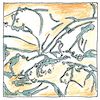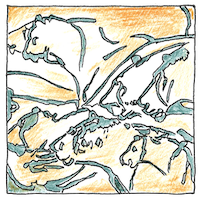Édouard Lartet, Louis Lartet
primatology

|
Cro-Magnons
Édouard Lartet, fascinated with fossils, found countless fossilized mammal bones digging in Sansan Hill in Gascony, including the first fossil anthropoid jawbone of the species named Pliopithecus antiquus leading to the conjecture that early apes and humans lived together far back in time. Édouard and his son, Louis, excavated a cave near Aurignac in southern France where human bones had been found in a rabbit hole and found more human bones associated with the bones of extinct animals. The idea that we used to eat mammals that have become extinct was too strange for people to accept readily but then Louis discovered bones of humans buried purposefully with stone tools and perforated shells and animal teeth, among scattered bones of lion, reindeer, and mammoth, under an outcropping of rock near Les Eyzes in the Dordogne, in an area known as Cro-Magnon.
A place in time
A dot on the horizon of the ocean was an ocean liner. Far back in time was a home we used to live in during a childhood we cannot remember.
Myth
Anatomically modern humans lived and died beside extinct mammals well before the stories in Genesis. What kind of myth is this excavated from the floors of caves? Obviously, these people could not have been as smart as we are today.



I have stubbornly resisted the idea that our own kind is special in the capabilities of our hearts or minds. Other animals also have hearts and minds and it is narrow-minded to assume that they do not use them in the same ways we use ours. Our record of intelligence is not matched by our ability to control and to manufacture; other animals have better histories of survival without killing others or destroying the environment that their survival depends on. The fact that Cro-Magnon and Neanderthals are gone today does not show that they were incapable of surviving, accepting the possibility that our ancestors killed them. Our record of narrow-mindedness and lack of sympathy to others is well established and might be blinding us to the fact that they are us.
The discoveries of Édouard and Louis Lartet did a little to overthrow our self-centeredness.
See also in The book of science:
Readings in wikipedia: